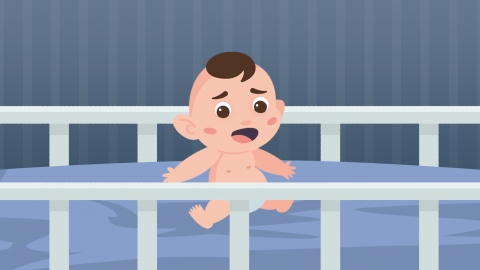What does it mean when a baby lies down and lifts their back?
Generally, the main causes of a baby lifting their waist while lying down include growth and development exploration, abdominal discomfort, vitamin D deficiency rickets, gastroesophageal reflux, and cerebral palsy. If symptoms occur frequently or are accompanied by abnormalities, it is recommended to seek medical examination at a regular hospital promptly. Detailed analysis is as follows:
1. Growth and Development Exploration
As the baby grows older, lifting the waist helps strengthen the back muscles and explore physical mobility. This is a normal physiological behavior. No special treatment is required. Provide a safe space for activity when the baby is awake, and assist with exercises such as rolling over and lifting the head.

2. Abdominal Discomfort
Babies have weak gastrointestinal function, and conditions such as bloating and intestinal colic can cause abdominal discomfort, which may be relieved by lifting the waist. Gently massage the baby's abdomen in a clockwise direction, burp the baby promptly after feeding, avoid overfeeding, and use simethicone emulsion to aid gas release if necessary.
3. Vitamin D Deficiency Rickets
Vitamin D deficiency leads to insufficient calcium absorption, affecting bone development. The baby may show symptoms such as irritability, excessive sweating, and lifting the waist. Under a doctor's guidance, administer vitamin D drops, calcium carbonate D3 granules, or calcium gluconate oral solution, and ensure the baby gets more sun exposure.
4. Gastroesophageal Reflux
Due to incomplete development of the lower esophageal sphincter in babies, milk may reflux and irritate the esophagus, causing discomfort and prompting the baby to lift their waist. Hold the baby upright for 30 minutes after feeding, and elevate the upper body slightly while sleeping. If symptoms are severe, follow medical advice to administer domperidone suspension, aluminum magnesium carbonate suspension, or omeprazole enteric-coated capsules.
5. Cerebral Palsy
Brain injury causing motor dysfunction may lead to abnormal postures in babies, such as frequent waist lifting and limb stiffness. Early hospital evaluation is necessary. Rehabilitation training may be conducted, and selective posterior rhizotomy may be considered if required, followed by long-term postoperative rehabilitation therapy.
Closely monitor the baby's condition in daily life, attend regular pediatric health checkups, ensure proper feeding, and maintain balanced nutrition. Seek medical attention promptly if the baby shows abnormal crying or developmental delays.







